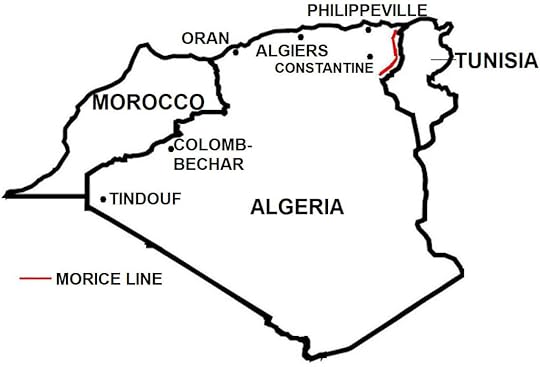December 14, 1960 – The UN passes Resolution 1514 (XV) titled “Declaration of the Granting of Independence to Colonial Countries and Peoples”
On December 14, 1960, the United Nations General Assembly(UNGA) passed Resolution 1514 (XV) titled “Declaration of the Granting ofIndependence to Colonial Countries and Peoples”, which establisheddecolonization as a fundamental principle of the UN. Five days later, on December 19, the UNreleased UNGA Resolution 1573 that recognized the right of self-determinationof the Algerian people.
On January 8, 1961, in a referendum held in France and Algeria,75% of the voters agreed that Algeriamust be allowed self-determination. TheFrench government then began to hold secret peace negotiations with theFLN. In April 1961, four retired FrenchArmy officers (Generals Salan, Challe, André Zeller, and Edmond Jouhaud, andassisted by radical elements of the pied-noir community) led the French commandin Algiers in a military uprising that deposed the civilian government of thecity and set up a four-man “Directorate”. The rebellion, variously known as the 1961 Algiers Putsch (French:Putsch d’Alger) or Generals’ Putsch (French: Putsch des Généraux), was a coupto be carried out in two phases: taking over authority in Algeria with thedefeat of the FLN and establishment of a civilian government; and overthrowingde Gaulle in Paris by rebelling paratroopers based near the French capital.
 Algerian War of Independence.
Algerian War of Independence.(Taken from Algerian War of Independence – Wars of the 20th Century – Volume 4)
De Gaulle invoked the constitution’s provision that gave himemergency powers, declared a state of emergency in Algeria, and in a nationwidebroadcast on April 23, appealed to the French Army and civilian population toremain loyal to his government. TheFrench Air Force flew the empty air transports from Algeriato southern France toprevent them from being used by rebel forces to invade France, while the French commands in Oran and Constantineheeded de Gaulle’s appeal and did not join the rebellion. Devoid of external support, the Algiersuprising collapsed, with Generals Challe and Zeller being arrested and laterimprisoned by military authorities, together with hundreds of other mutineeringofficers, while Generals Salan and Jouhaud went into hiding to continue thestruggle with the pieds-noirs against Algerian independence.
On April 28, 1961, in the midst of the uprising, Frenchmilitary authorities test-fired France’s first atomic bomb in the SaharaDesert, moving forward the date of the detonation ostensibly to prevent thenuclear weapon from falling into the hands of the rebel troops. The attempted coup dealt a serious blow toFrench Algeria, as de Gaulle increased efforts to end the war with the Algeriannationalists.
In May 1961, the French government and the GPRA (the FLN’sgovernment-in-exile) held peace talks at Évian, France, whichproved contentious and difficult. But onMarch 18, 1962, the two sides signed an agreement called the Évian Accords,which included a ceasefire (that came into effect the following day) and arelease of war prisoners; the agreement’s major stipulations were: Frenchrecognition of a sovereign Algeria; independent Algeria’s guaranteeing theprotection of the pied-noir community; and Algeria allowing French militarybases to continue in its territory, as well as establishing privilegedAlgerian-French economic and trade relations, particularly in the developmentof Algeria’s nascent oil industry.
In a referendum held in France on April 8, 1962, over 90% ofthe French people approved of the Évian Accords; the same referendum held inAlgeria on July 1, 1962 resulted in nearly six million voting in favor of theagreement while only 16,000 opposed it (by this time, most of the one millionpieds-noirs had or were in the process of leaving Algeria or simply recognizedthe futility of their lost cause, thus the extraordinarily low number of “no”votes).
However, pied-noir hardliners and pro-French Algeriamilitary officers still were determined to derail the political process,forming one year earlier (in January 1961) the “Organization of the SecretArmy” (OAS; French: Organisation de l’armée secrète) led by General Salan, in a(futile) attempt to stop the 1961 referendum to determine Algerianself-determination. Organizedspecifically as a terror militia, the OAS had begun to carry out violentmilitant acts in 1961, which dramatically escalated in the four months betweenthe signing of the Évian Accords and the referendum on Algerianindependence. The group hoped that itsterror campaign would provoke the FLN to retaliate, which would jeopardize theceasefire between the government and the FLN, and possibly lead to a resumptionof the war. At their peak in March 1962,OAS operatives set off 120 bombs a day in Algiers,targeting French military and police, FLN, and Muslim civilians – thus, the warhad an ironic twist, as France and the FLN now were on the same side of theconflict against the pieds-noirs.
The French Army and OAS even directly engaged each other –in the Battle of Bab el-Oued, where French security forces succeeded in seizingthe OAS stronghold of Bab el-Oued, a neighborhood in Algiers, with combined casualties totaling 54dead and 140 injured. The OAS alsotargeted prominent Algerian Muslims with assassinations but its main target wasde Gaulle, who escaped many attempts on his life. The most dramatic of the assassinationattacks on de Gaulle took place in a Parissuburb where a group of gunmen led by Jean-Marie Bastien-Thiry, a Frenchmilitary officer, opened fire on the presidential car with bullets from theassailants’ semi-automatic rifles barely missing the president. Bastien-Thiry, who was not an OAS member, wasarrested, put on trial, and later executed by firing squad.
In the end, the OAS plan to provoke the FLN into launchingretaliation did not succeed, as the Algerian revolutionaries adhered to theceasefire. On June 17, 1962, the OAS theFLN agreed to a ceasefire. Theeight-year war was over. Some 350,000 toas high as one million people died in the war; about two million AlgerianMuslims were displaced from their homes, being forced by the French Army torelocate to guarded camps.



